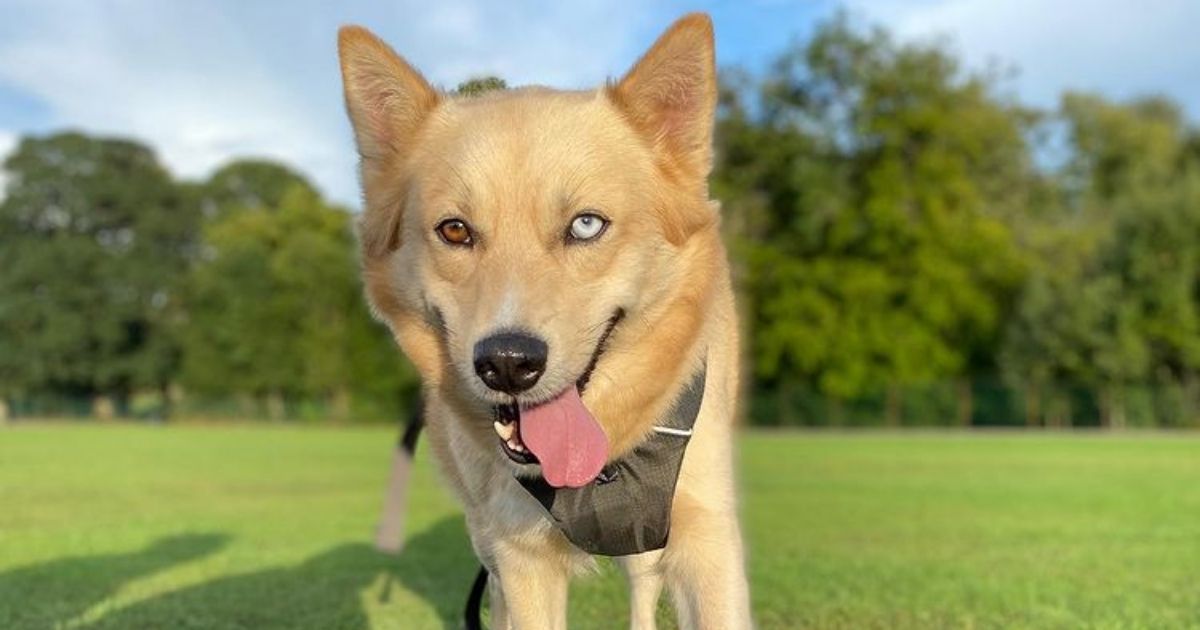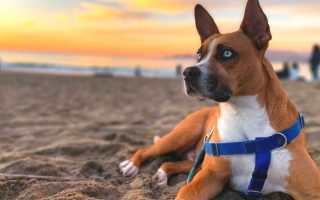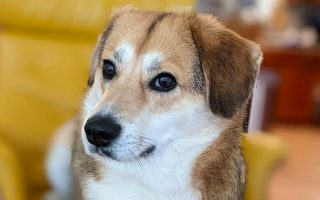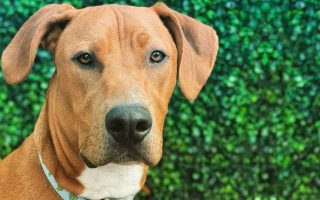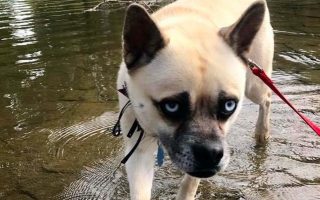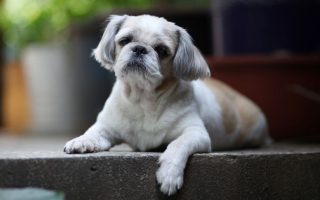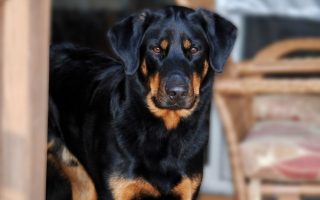The Shiba Inu Husky Mix is a designer hybrid dog, developed from the crossing of two pure breeds: The Shiba Inu and the Siberian Husky.
The latter originated in Japan while the former is a Siberian sledder.
Both contributed to the fashioning of the Shiba Inu Husky Mix, also known as the Husky Inu.
The wolf-like appearance and cuteness the designer breed got from its parents made it gain some popularity in the United States.
This may not be complete good news though. Popular dogs like the Husky Inu get a high demand, but many buyers don’t stop to consider if the dog breed is suitable for them.
Similar to other dog breeds, the Husky Inu has both beautiful and challenging traits. While it is intelligent and has adorable looks, it isn’t a breed for everyone.
Failure to know this ends with shelters getting filled up courtesy of frustrated pet parents.
Read on to get more information on this breed. You’ll get acquainted with its characteristics, parents, coat colors, personality, and more.
Shiba Husky Mixed Breed Information
| Height | 15 to 20 inches |
| Weight | 25 to 50 pounds |
| Lifespan | 12 to 16 years |
| Coat | Fluffy, dense |
| Colors | Black and tan, cream, red, red sesame, black and white |
| Temperament | Loyal, affectionate, curious |
| Ideal For | Experienced pet parents |
Husky Inu Characteristics
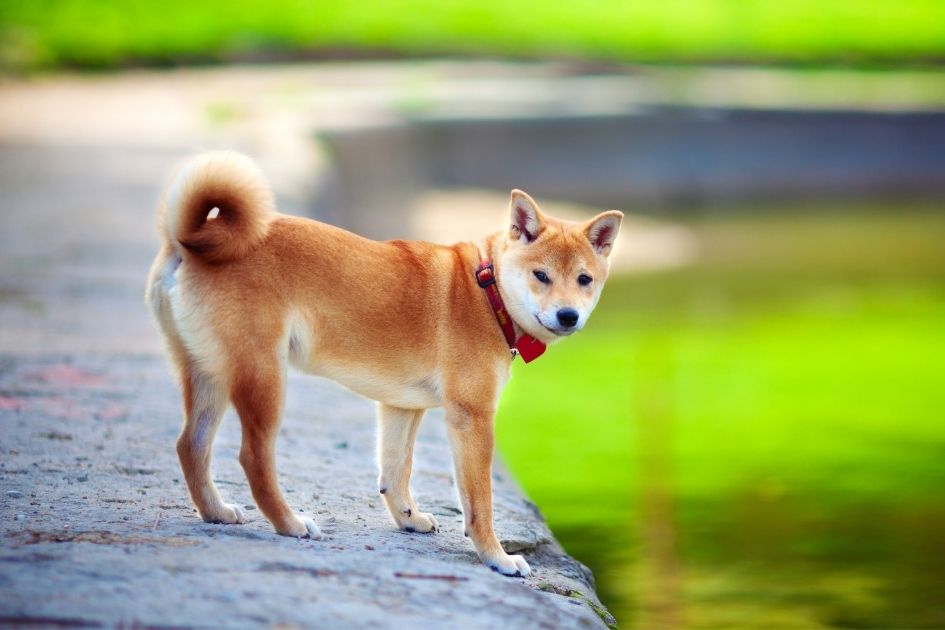
| Health | High |
| Grooming | High |
| Friendliness | High |
| Energy | High |
| Trainability | Medium |
The Parent Breed
Shiba Inu
The Shiba Inu is a native breed of Japan and relative of other Japanese dog breeds including the Akita Inu, Kishu, and Hokkaido.
The Shiba Inu was a Japanese national treasure until the mid 20th century. It was used to hunt down small prey.
The Shiba Inu nearly met its waterloo during the Second World War and a few years after.
Various breeders contributed to saving the breed and in 1948 a standard was established by Nihon Ken Hozonkai. This was after the foundation of the Japanese Kennel Club.
In 1954, the Shiba Inu got into the United States thanks to a military family. In 1979, the first American Shiba Inu pups were born.
This cumulated to registration in the AKC in 1993. This breed is the 44th most popular dog as of 2020.
Currently, the Shiba Inu is bred to be a companion and hardly hunts. It is an observant and active breed with boldness up the sleeves.
Though wary of strangers, this breed is friendly and loving.
Possessiveness is a challenge though. This breed is overprotective of its toys and space, a behavior that may lead to aggression. It should be curbed.
Siberian Husky
The Siberian Husky‘s popularity spiked with the success of Game of Thrones. Dogs of this breed resembled the dire wolves on the show, making people interested in them.
Before their rise to fame, Huskies were developed to pull sleds across the snow in the cold region of Siberia.
They are one of the oldest dog breeds and lived amongst the Chucki nomads.
In 1908, Siberian Huskies got into Alaska and partook in the gold rush. This marks their first entry into the United States.
By the 1930s, they were booming in North America. The Siberian Club of America was formed in their honor in 1938.
Before then, they were recognized by the American Kennel Club. In 2020, they were ranked the 14th most popular breed.
The Siberian Husky is more extroverted and playful than the Shiba Inu and has no reservations against strangers.
These dogs would rather try to befriend those they don’t know.
They can be stubborn (like the Shiba Inu), but training is possible once you’ve established your place as the leader.
Important Facts About Shiba Inu Husky Mix You Should Know
1. They can be dominant
The Husky Inu got the intelligence, independent spirit, and stubbornness that’s existent in both parents.
The Shiba Inu is just as stubborn as the Siberian Husky. Both have minds of their own and they have high IQs.
This makes the offspring a poor choice for first-time owners or those with no experience with stubborn dogs.
If you don’t enforce your leadership, these dogs will take over.
2. Their personality is like a rainbow
The Husky Inu has parents with personalities that are different.
The Shiba Inu is a wary, independent dog breed that can stay alone. The Siberian Husky tends to stick close to the owner, is friendly with everyone, and is not the kind of pet you leave alone.
This allows the designer breed to be the best of two ends.
Different combinations present different personalities, and in that way, the Husky Inu has a rich personality.
3. Consider your environment before getting this breed
The Shiba Inu Husky Mix can cope in an apartment, but cramped spaces are not recommended for this breed.
Its energy will require space, both in the living room and out in the yard. If you have a small flat, consider a better-fitting breed.
A large space also caters to the parents’ traits which may appear in the hybrid.
Shiba Inus want to have a territory and Siberian Huskies need to run around.
4. Get ready for exercise
If your idea of exercise stops at a short stroll, the Husky Inu will either challenge or frustrate you.
Coming from parents who love exercise, the designer breed shouldn’t be left without exercise.
Not only is it unhealthy, but it can also create behavioral problems. An unexercised Husky Inu will get bored and destroy the place.
5. Make brushing a skill
Both Siberian Huskies and Shiba Inus are shedders, which means they require extra brushing.
Irrespective of which parent your designer pet resembles more, there is a high tendency for it to shed.
Therefore, the Husky Inu should be brushed daily. Grooming this breed isn’t so easy, so you need to invest in it.
Bathing can also help reduce dead hair, but the latter shouldn’t be a regular activity.
Shiba Husky Appearance
Physical Appearance
The Shiba Husky is lucky to have parents with a close resemblance.
Thus, you’re unlikely to see big differences between the dogs of this breed. The wild looks and pointed ears can’t change.
Furthermore, the nose may be square and fleshy. As for the eyes, they could be dark, amber, bright blue, or even multi-colored like the Siberian Husky.
Size
The Husky Inu usually weighs between 25 to 50 pounds. This falls between the smaller Shiba Inu and the bigger Siberian Husky. It also grows between 15 to 20 inches.
All in all, the Husky Inu falls in between the spectrum that has both the Shiba Inu and Siberian Husky on each side.
Colors and Coat Type
The Husky Inu always comes with a fluffy coat. Like its parents, it has a double coat. The outer one is denser than the softer, inner coat.
The coat keeps them warm during the chilly weather, but it also means they shouldn’t be in a place with extreme heat.
The common coat colors you’ll find on the hybrid are black and tan, cream, red, red sesame, black and white, gray and white, brown and white.
Temperament, Behavior & Intelligence
Like other designer breeds, do not expect a standard set of behavior and personality from the Husky Inu.
This is even more so because of the wide difference in the personality of the parent breeds.
Some of the mixed dogs may act more like the Shiba Inu while others may be as outgoing as the Siberian Husky.
The third group is those who combine the temperaments. While this is one pet parents want, it is not always the case.
Having said that, some traits are common amongst all Shiba Husky dogs. One of these is intelligence.
The Shiba Inu Husky mix has a high IQ that makes it behave almost human sometimes. This comes in handy, especially during training.
What may serve as a stumbling block when training this breed is its stubbornness.
Like we’ve already pointed at, the Husky Inu inherited the stubbornness of its parents and has the tendency to be dominant. This should be deterred before it gets out of hand.
Notwithstanding the challenges, the Husky Inu is a loyal and affectionate breed. Even those who took the wariness of the Shiba Inu show love to their families.
A combination of personalities will give you a pet with family-friendly qualities.
Is a Siberian Husky Inu a Good Family Dog?
The Siberian Husky Shiba Inu Mix fits into the families of those who understand its personality and antics.
It is loyal, sociable and an affectionate pet, but may have a conflict with a pet parent who can’t handle its stubbornness.
This breed is not an all-size family dog, and some individuals may do well to steer clear of it.
But for those who can train these dogs, they make excellent household companions.
Are They Good With Other Dogs & Pets?
If your Shiba Husky gets the possessive trait of the Shiba Inu, it may have problems with other canines. Other than that, there shouldn’t be any difficulties.
Shiba Huskies may not be recommended for a house with cats and other pets due to their high prey drive gotten from the parent breeds.
How Much Does Shiba Inu Husky Mix Puppies Cost?
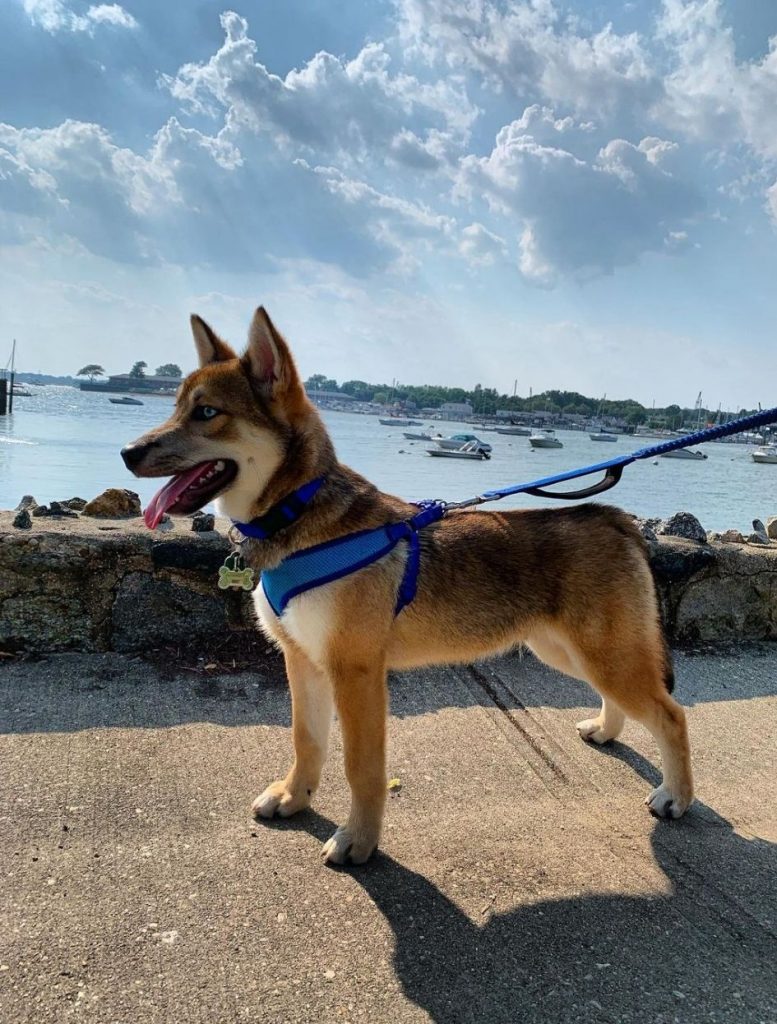
The Shiba Husky is fairly new, so there isn’t much information about the pricing. Nevertheless, you can budget between $500 to $1,000 for the cost of a simple puppy.
You should locate a breeder with a good reputation and the right documents to show.
Getting a pup from a breeder who isn’t trustworthy is risky as you may end up battling some inherited medical conditions.
Shiba Huskies are not often found in adoption shelters, but now and then you may see one amongst purebred Shibas or Huskies.
Be sure to get one of those cuties home. Not only is it less costly, but it is also a service. It may not be a smooth ride, though.
Adopted canines come with pieces of baggage.
You May Like: Can You Change Your Rescue Dog’s Name
Caring for a Shiba Inu and Husky Mix
Food & Nutrition
Shiba Huskies are active dogs who use up a lot of energy. To keep them fit and still active, a diet rich in animal protein is recommended.
This isn’t peculiar to this breed, though. Dogs and protein are good friends.
This breed also needs vitamins and minerals which it can get from whole food. Some examples are corn, green, wheat, and oatmeal.
The diet should be tailored to the age and size of the breed. A Shiba Husky pup shouldn’t be fed adult or human food.
A larger Shiba Husky will require more than its smaller counterpart.
While there isn’t a fixed standard, it is generally recommended that this breed be fed 2 to 2.5 cups per day.
As with every other dog, be watchful for any weight gain. This would also mean controlling the treats you feed these dogs. Their parent, Shiba Inu, loves treats, and so they will.
Related: Top 10 Best Dog Food For Huskies (Review & Feeding Chart)
Exercise
At the very least, Husky Inu needs 60 minutes of exercise. If it gets the Husky’s energy, it may get up to 90 minutes.
If the thought of this sounds overwhelming, this designer breed may not be for you.
It is better not to have one than to get and then starve it of exercise. Even your properties won’t be happy.
Exercise should consist of both physical and mental activities. Physical activities can be done in many ways, from the usual walk to yard play.
Games like fetch and frisbee toss are also good examples of physical activities.
Mental activities include puzzles and a variety of games. Make it interesting and versatile to hold your pet’s attention and engage the mind.
A final tip to hold while exercising this breed is to put it on a leash. Both parent breeds have hunting instincts.
Without a leash, the Husky Inu may dart after a perceived prey. You should also fence your yard properly, in case your hybrid buddy inherited the Houdini skills of the Siberian Husky.
Training for this breed should start as early as possible. This would give you time to assert your authority and set obedience training in place.
Plus, it’s easier to train a pup than an adult.
Training is challenging and sometimes difficult with this breed, just as it is with the parents.
The Husky Inu isn’t a Golden Retriever who’s eager to please. On the contrary, this designer pooch may not want to obey you.
To make things harder, each parent comes with some specific antics. The Shiba Inu hardly shares its toys and is guarded around foreign faces, so socialization is needed if your mixed breed takes this attribute.
The Siberian Husky may be busy or distracted to focus on your command. Either way, it isn’t a simple ride.
However, it isn’t impossible. To train this breed, you need a set of skills. Experience, patience, consistency, and the right motivations will ensure better success.
Grooming Needs
Grooming a Siberian Husky Inu mix is another area that needs a lot of effort. If it’s not something you wish to do on your own, you can employ the services of a groomer.
However, you may not need to once you get the hang of it.
The Shiba Husky needs a lot of brushing. During normal periods, regular brushing is enough for this breed.
Make use of a de-shedding tool to take care of the undercoat. When your pet starts shedding, brush daily.
This designer breed self cleans, so it doesn’t need a regular bath. You can bathe it every once in a while, especially when it is shedding.
Do not neglect other forms of hygiene as well. Brush your pet’s teeth regularly to keep them strong and less likely to decay.
Clip the nails to prevent your furry buddy from being injured during playtime because of long nails.
While this breed does not have drooping ears that are susceptible to infections, they should be cleaned off excess wax.
Health Conditions
Every other need won’t matter if your Shiba Husky is ill. Fortunately, this breed has a long life span of 12 to 16 years.
You have a big role to play in ensuring your pet gets to the golden years. Vaccinations and regular checkups are essential.
You also should know what conditions this breed is vulnerable to
Some of them are:
Hip Dysplasia
Hip dysplasia is an abnormality in the hip joint where the ball and socket of the joint do not fit. While it is often inherited, other factors can lead to hip dysplasia.
They include obesity, accidents, and injuries. Some dogs display symptoms while others don’t.
Patellar Luxation
Patellar Luxation often ends up with the affected dog getting lame.
It happens to both large and small dogs and occurs when the kneecap shift from its normal position. It is painful, limits the movement of the dog, and can render the latter lame.
Allergies
Shiba Huskies may be prone to some allergies. It could be from the food eaten or from a substance like pollen.
Signs of allergies may include discomfort, excess licking of paws and rubbing of face, and swelling in more serious cases.
Cataract
Cataracts affect dogs the way it does to humans. It manifests with a white cloud progressively covering the dog’s eye lens.
It impairs vision and can make your pet uncomfortable. It is often removed with surgery.
Glaucoma
This ailment occurs when there’s an increase in eye pressure. It turns the eyes red and leaves your pet in severe pain.
Left untreated, glaucoma can make your dog blind. Fortunately, it can be treated through surgery or eye drops.
FAQs
How big do Shiba Huskies get?
Shiba Huskies’ size falls between both parents. When fully grown, the Shiba Husky gets a weight of 25 to 50 pounds with a height of 15 to 20 inches.
Is a Shiba Inu like a Husky?
Shiba Inus and Huskies are different breeds, but they share similar appearances due to their resemblance to wild animals. The Shiba Inu looks like a fox while the Siberian Husky is more like a wolf.
Wrap Up
When you cross two strong, courageous, stubborn and independent dog breeds, you get the Shiba Inu Husky Mix.
This isn’t a designer breed for the faint of heart, but anyone who can overcome the hurdles of taking care of this dog will get the benefits.
For that, you need to be committed to the well-being of your pet.
Pet parenting is a long-term journey with its ups and downs, but it is worth it when you come prepared.
You May Also Like: 10 Dogs That Look Like Coyotes But Aren’t

